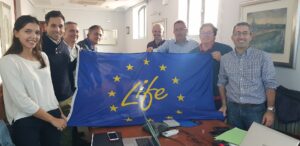
One-third of the world’s freshwater is in aquifers. In Europe, groundwater is the main source of freshwater for a great part of the population. However, most aquifers in this region are in bad condition because they have a high concentration of nitrates. This prevents the use of this resource for certain uses, such as human consumption. Nowadays, there are different solutions to tackle this situation. Nevertheless, these techniques have a negative impact for the environment, as they consume a lot of energy and generate a large amount of waste.
In this context, the LIFE NIRVANA project, led by Cetaqua Andalucía, has recently started. This initiative, in which Aguas de Murcia and Aquatec are also participating, will develop and validate at pilot level an innovative and effective technology for in-situ bioremediation of groundwater, which will allow to reduce the concentration of nitrates present in aquifers in a sustainable way. Besides, a business model and a replication plan will be developed to apply this new methodology in other aquifers in Europe.
In particular, the technology developed by the project will reduce the concentration of nitrates in the environment of the pilot, located in the Zarandona well (Murcia, Spain), to a value below 30mg/l, significantly lower than the maximum allowed by law for human consumption, 50 mg/l. Furthermore, the fact that this technique is applied in-situ will reduce CO2 emissions and the energy cost of this activity, as well as its economic cost compared to other techniques. Likewise,, it will not generate waste, in contrast to current solutions.
The kick-off meeting took place in Murcia on 23th October 2019. The project partners met to share the main challenges of this initiative, as well as those of groundwater remediation, in a clear commitment to the preservation of the quality of this resource.
LIFE NIRVANA is the first LIFE project led by Cetaqua Andalucía, a foundation created in 2014 by Hidralia, the University of Malaga (UMA) and the Spanish National Research Council (CSIC). This public-private collaboration model, which was created to guarantee the sustainability and efficiency of the water cycle, taking territorial needs into account, has become a reference in the application of academic knowledge to water and the environment, creating products and services that benefit society.
